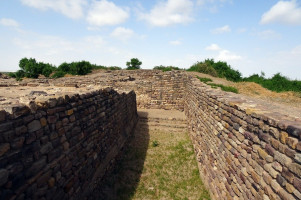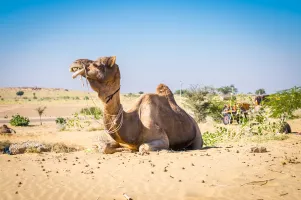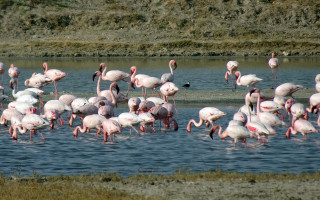Kutch Bustard Sanctuary Travel Guide
Kutch Bustard Sanctuary, located in the state of Gujarat, India, is a haven for birdwatchers and nature enthusiasts. The sanctuary is renowned for its vast grasslands, home to a diverse range of bird species, including the endangered great Indian bustard. The region is steeped in history, with ancient archaeological sites and a rich cultural heritage that dates back centuries. Kutch Bustard Sanctuary is famous for its wildlife conservation efforts and unique ecosystem that supports a variety of flora and fauna.Top Attractions in Kutch Bustard Sanctuary
1. Great Indian Bustard sightings 2. Chhari Dhand Bird Sanctuary 3. Kala Dungar (Black Hill) 4. Kutch Desert Wildlife Sanctuary 5. Handicraft villages showcasing local cultureKutch Bustard Sanctuary is Famous for
Its diverse bird population, including the endangered great Indian bustard.Top Attractions in Kutch Bustard Sanctuary
- Great Indian Bustard sightings - Chhari Dhand Bird Sanctuary - Kala Dungar (Black Hill) - Kutch Desert Wildlife Sanctuary - Handicraft villages showcasing local cultureWhat's Great about Travelling to Kutch Bustard Sanctuary?
- Birdwatching opportunities - Rich cultural experiences - Serene natural landscapesWhat's Not So Great about Travelling to Kutch Bustard Sanctuary?
- Limited accommodation options - Remote location may require long travel times - Harsh weather conditions in summer monthsTravel Tips for Kutch Bustard Sanctuary
- Obtain necessary permits for birdwatching - Pack sunscreen and hats for sun protection - Respect local customs and wildlife regulationsImportant Kutch Bustard Sanctuary trip information
- Ideal Duration: 2-3 days
- Best Time to Visit: November to February for birdwatching
- Nearby Airports and Railway Stations: Bhuj Airport and Bhuj Railway Station
Per Person
20,288
*EXCLUDING APPLICABLE TAXES Per Person
17,520
*EXCLUDING APPLICABLE TAXES Per Person
24,548
*EXCLUDING APPLICABLE TAXES 4.9 Ratings
( 200 Reviews )
( 200 Reviews )
Per Person
15,000
*EXCLUDING APPLICABLE TAXES 4.3 Ratings
( 337 Reviews )
( 337 Reviews )
Per Person
13,960
*EXCLUDING APPLICABLE TAXES Per Person
18,900
*EXCLUDING APPLICABLE TAXES FAQ's on Kutch Bustard Sanctuary
Q1: What is the best time to visit Kutch Bustard Sanctuary?
The best time to visit Kutch Bustard Sanctuary is between November and February when the weather is pleasant and ideal for wildlife viewing. This period also coincides with the Rann Utsav, a cultural festival showcasing the vibrant culture of the region. Avoid visiting during the monsoon season from July to September, as heavy rains can make the area inaccessible.
Q2: Do I need a visa to travel to Kutch Bustard Sanctuary?
International tourists visiting Kutch Bustard Sanctuary will need a valid Indian tourist visa. Make sure to check the latest visa requirements and apply in advance. Visitors from certain countries may be eligible for e-Visas or visa-on-arrival facilities. It is advisable to confirm the visa regulations before planning your trip.
Q3: What are the must-visit attractions in Kutch Bustard Sanctuary?
The must-visit attractions in Kutch Bustard Sanctuary include the Great Indian Bustard Sanctuary, where you can spot the endangered bird species, and the Rann of Kutch, a vast salt marsh known for its unique landscape. Don't miss the Kala Dungar (Black Hill) for panoramic views and the handicraft villages of Bhuj for traditional art and crafts.
Q4: Is Kutch Bustard Sanctuary a safe place to travel?
Kutch Bustard Sanctuary is generally safe for tourists, but it's advisable to follow basic safety precautions. Avoid venturing into isolated areas alone, respect wildlife, and stay informed about any local regulations. Be cautious while driving on remote roads and always carry necessary supplies for emergencies.
Q5: What is the local currency in Kutch Bustard Sanctuary and can I use credit cards?
The local currency in Kutch Bustard Sanctuary is the Indian Rupee (INR). While credit cards are accepted in major establishments in towns like Bhuj, it's recommended to carry cash when visiting rural areas or local markets. ATMs are available in towns for convenient cash withdrawals.
Q6: What is the local cuisine like in Kutch Bustard Sanctuary?
The local cuisine in Kutch Bustard Sanctuary offers a mix of traditional Gujarati dishes and unique Kutchi delicacies. Don't miss trying the famous Kutchi Dabeli, a spicy potato sandwich, and the regional staple, Bajra no Rotlo (millet bread). For dessert, indulge in the sweet treat of Malpua or the refreshing Chaas (buttermilk).
Q7: What transportation options are available in Kutch Bustard Sanctuary?
Transportation options in Kutch Bustard Sanctuary include buses, taxis, and rental cars for getting around. Public buses connect major towns like Bhuj to the sanctuary, while hiring a taxi or car offers more flexibility for exploring remote areas. Auto-rickshaws and camel carts are also popular for short distances.
Q8: Are there any cultural norms or etiquette I should be aware of when visiting Kutch Bustard Sanctuary?
When visiting Kutch Bustard Sanctuary, it's important to respect the local customs and traditions. Dress modestly, especially when visiting religious sites or rural villages. Seek permission before taking photographs of people, and be mindful of local beliefs and practices. Greeting with a smile and a "Namaste" is appreciated as a sign of respect.
Q9: I am a travel agent. How can I buy travel leads of Kutch Bustard Sanctuary?
Register yourself as a travel agent at agents.tripclap.com and then you can buy travel leads to Kutch Bustard Sanctuary once your account is approved. For more details contact our support team at +91-8069186564 or support@tripclap.com





